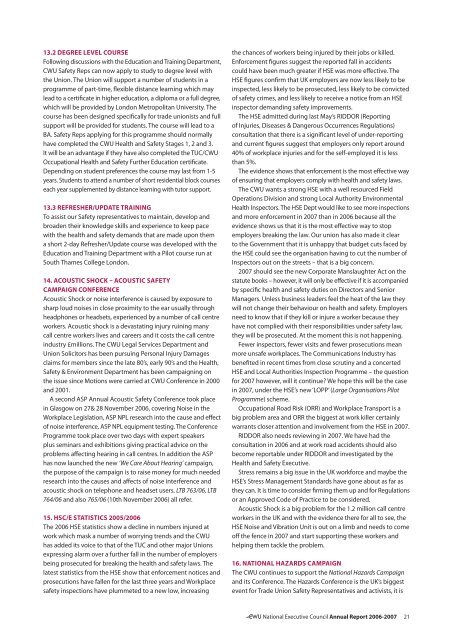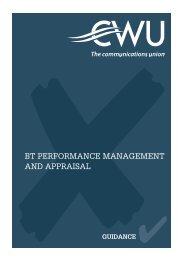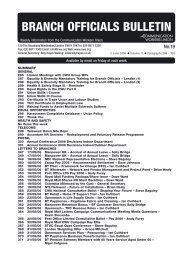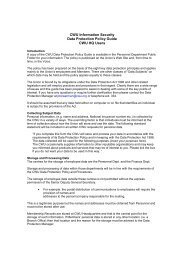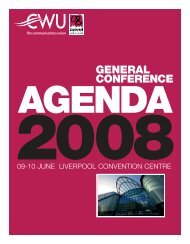the CWU's Annual Report for 2006-2007
the CWU's Annual Report for 2006-2007
the CWU's Annual Report for 2006-2007
You also want an ePaper? Increase the reach of your titles
YUMPU automatically turns print PDFs into web optimized ePapers that Google loves.
13.2 DEGREE LEVEL COURSE<br />
Following discussions with <strong>the</strong> Education and Training Department,<br />
CWU Safety Reps can now apply to study to degree level with<br />
<strong>the</strong> Union. The Union will support a number of students in a<br />
programme of part-time, flexible distance learning which may<br />
lead to a certificate in higher education, a diploma or a full degree,<br />
which will be provided by London Metropolitan University. The<br />
course has been designed specifically <strong>for</strong> trade unionists and full<br />
support will be provided <strong>for</strong> students. The course will lead to a<br />
BA. Safety Reps applying <strong>for</strong> this programme should normally<br />
have completed <strong>the</strong> CWU Health and Safety Stages 1, 2 and 3.<br />
It will be an advantage if <strong>the</strong>y have also completed <strong>the</strong> TUC/CWU<br />
Occupational Health and Safety Fur<strong>the</strong>r Education certificate.<br />
Depending on student preferences <strong>the</strong> course may last from 1-5<br />
years. Students to attend a number of short residential block courses<br />
each year supplemented by distance learning with tutor support.<br />
13.3 REFRESHER/UPDATE TRAINING<br />
To assist our Safety representatives to maintain, develop and<br />
broaden <strong>the</strong>ir knowledge skills and experience to keep pace<br />
with <strong>the</strong> health and safety demands that are made upon <strong>the</strong>m<br />
a short 2-day Refresher/Update course was developed with <strong>the</strong><br />
Education and Training Department with a Pilot course run at<br />
South Thames College London.<br />
14. ACOUSTIC SHOCK – ACOUSTIC SAFETY<br />
CAMPAIGN CONFERENCE<br />
Acoustic Shock or noise interference is caused by exposure to<br />
sharp loud noises in close proximity to <strong>the</strong> ear usually through<br />
headphones or headsets, experienced by a number of call centre<br />
workers. Acoustic shock is a devastating injury ruining many<br />
call centre workers lives and careers and it costs <strong>the</strong> call centre<br />
industry £millions. The CWU Legal Services Department and<br />
Union Solicitors has been pursuing Personal Injury Damages<br />
claims <strong>for</strong> members since <strong>the</strong> late 80’s, early 90’s and <strong>the</strong> Health,<br />
Safety & Environment Department has been campaigning on<br />
<strong>the</strong> issue since Motions were carried at CWU Conference in 2000<br />
and 2001.<br />
A second ASP <strong>Annual</strong> Acoustic Safety Conference took place<br />
in Glasgow on 27& 28 November <strong>2006</strong>, covering Noise in <strong>the</strong><br />
Workplace Legislation, ASP NPL research into <strong>the</strong> cause and effect<br />
of noise interference, ASP NPL equipment testing. The Conference<br />
Programme took place over two days with expert speakers<br />
plus seminars and exhibitions giving practical advice on <strong>the</strong><br />
problems affecting hearing in call centres. In addition <strong>the</strong> ASP<br />
has now launched <strong>the</strong> new ‘We Care About Hearing’ campaign,<br />
<strong>the</strong> purpose of <strong>the</strong> campaign is to raise money <strong>for</strong> much needed<br />
research into <strong>the</strong> causes and affects of noise interference and<br />
acoustic shock on telephone and headset users. LTB 763/06, LTB<br />
764/06 and also 765/06 (10th November <strong>2006</strong>) all refer.<br />
15. HSC/E STATISTICS 2005/<strong>2006</strong><br />
The <strong>2006</strong> HSE statistics show a decline in numbers injured at<br />
work which mask a number of worrying trends and <strong>the</strong> CWU<br />
has added its voice to that of <strong>the</strong> TUC and o<strong>the</strong>r major Unions<br />
expressing alarm over a fur<strong>the</strong>r fall in <strong>the</strong> number of employers<br />
being prosecuted <strong>for</strong> breaking <strong>the</strong> health and safety laws. The<br />
latest statistics from <strong>the</strong> HSE show that en<strong>for</strong>cement notices and<br />
prosecutions have fallen <strong>for</strong> <strong>the</strong> last three years and Workplace<br />
safety inspections have plummeted to a new low, increasing<br />
<strong>the</strong> chances of workers being injured by <strong>the</strong>ir jobs or killed.<br />
En<strong>for</strong>cement figures suggest <strong>the</strong> reported fall in accidents<br />
could have been much greater if HSE was more effective. The<br />
HSE figures confirm that UK employers are now less likely to be<br />
inspected, less likely to be prosecuted, less likely to be convicted<br />
of safety crimes, and less likely to receive a notice from an HSE<br />
inspector demanding safety improvements.<br />
The HSE admitted during last May’s RIDDOR (<strong>Report</strong>ing<br />
of Injuries, Diseases & Dangerous Occurrences Regulations)<br />
consultation that <strong>the</strong>re is a significant level of under-reporting<br />
and current figures suggest that employers only report around<br />
40% of workplace injuries and <strong>for</strong> <strong>the</strong> self-employed it is less<br />
than 5%.<br />
The evidence shows that en<strong>for</strong>cement is <strong>the</strong> most effective way<br />
of ensuring that employers comply with health and safety laws.<br />
The CWU wants a strong HSE with a well resourced Field<br />
Operations Division and strong Local Authority Environmental<br />
Health Inspectors. The HSE Dept would like to see more inspections<br />
and more en<strong>for</strong>cement in <strong>2007</strong> than in <strong>2006</strong> because all <strong>the</strong><br />
evidence shows us that it is <strong>the</strong> most effective way to stop<br />
employers breaking <strong>the</strong> law. Our union has also made it clear<br />
to <strong>the</strong> Government that it is unhappy that budget cuts faced by<br />
<strong>the</strong> HSE could see <strong>the</strong> organisation having to cut <strong>the</strong> number of<br />
Inspectors out on <strong>the</strong> streets – that is a big concern.<br />
<strong>2007</strong> should see <strong>the</strong> new Corporate Manslaughter Act on <strong>the</strong><br />
statute books – however, it will only be effective if it is accompanied<br />
by specific health and safety duties on Directors and Senior<br />
Managers. Unless business leaders feel <strong>the</strong> heat of <strong>the</strong> law <strong>the</strong>y<br />
will not change <strong>the</strong>ir behaviour on health and safety. Employers<br />
need to know that if <strong>the</strong>y kill or injure a worker because <strong>the</strong>y<br />
have not complied with <strong>the</strong>ir responsibilities under safety law,<br />
<strong>the</strong>y will be prosecuted. At <strong>the</strong> moment this is not happening.<br />
Fewer inspectors, fewer visits and fewer prosecutions mean<br />
more unsafe workplaces. The Communications Industry has<br />
benefited in recent times from close scrutiny and a concerted<br />
HSE and Local Authorities Inspection Programme – <strong>the</strong> question<br />
<strong>for</strong> <strong>2007</strong> however, will it continue? We hope this will be <strong>the</strong> case<br />
in <strong>2007</strong>, under <strong>the</strong> HSE’s new ‘LOPP’ (Large Organisations Pilot<br />
Programme) scheme.<br />
Occupational Road Risk (ORR) and Workplace Transport is a<br />
big problem area and ORR <strong>the</strong> biggest at work killer certainly<br />
warrants closer attention and involvement from <strong>the</strong> HSE in <strong>2007</strong>.<br />
RIDDOR also needs reviewing in <strong>2007</strong>. We have had <strong>the</strong><br />
consultation in <strong>2006</strong> and at work road accidents should also<br />
become reportable under RIDDOR and investigated by <strong>the</strong><br />
Health and Safety Executive.<br />
Stress remains a big issue in <strong>the</strong> UK work<strong>for</strong>ce and maybe <strong>the</strong><br />
HSE’s Stress Management Standards have gone about as far as<br />
<strong>the</strong>y can. It is time to consider firming <strong>the</strong>m up and <strong>for</strong> Regulations<br />
or an Approved Code of Practice to be considered.<br />
Acoustic Shock is a big problem <strong>for</strong> <strong>the</strong> 1.2 million call centre<br />
workers in <strong>the</strong> UK and with <strong>the</strong> evidence <strong>the</strong>re <strong>for</strong> all to see, <strong>the</strong><br />
HSE Noise and Vibration Unit is out on a limb and needs to come<br />
off <strong>the</strong> fence in <strong>2007</strong> and start supporting <strong>the</strong>se workers and<br />
helping <strong>the</strong>m tackle <strong>the</strong> problem.<br />
16. NATIONAL HAZARDS CAMPAIGN<br />
The CWU continues to support <strong>the</strong> National Hazards Campaign<br />
and its Conference. The Hazards Conference is <strong>the</strong> UK’s biggest<br />
event <strong>for</strong> Trade Union Safety Representatives and activists, it is<br />
l National Executive Council <strong>Annual</strong> <strong>Report</strong> <strong>2006</strong>-<strong>2007</strong> 21


